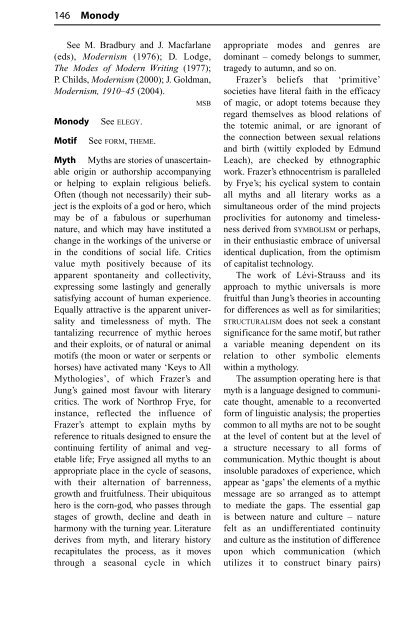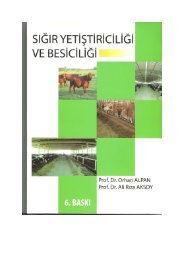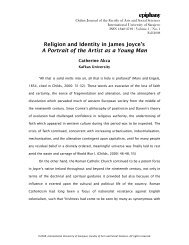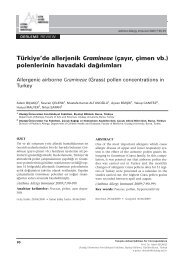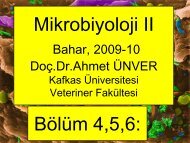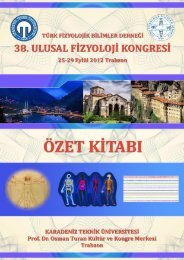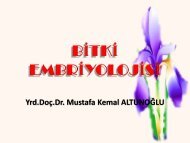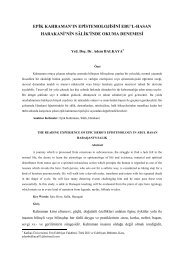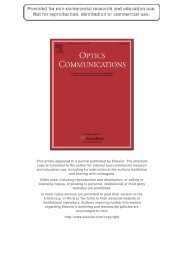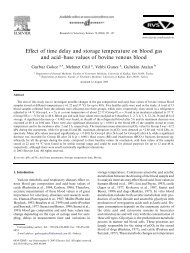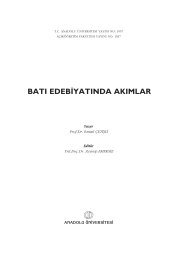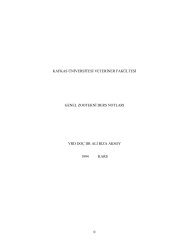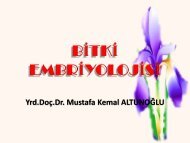The Routledge Dictionary of Literary Terms
The Routledge Dictionary of Literary Terms
The Routledge Dictionary of Literary Terms
Create successful ePaper yourself
Turn your PDF publications into a flip-book with our unique Google optimized e-Paper software.
146 Monody<br />
See M. Bradbury and J. Macfarlane<br />
(eds), Modernism (1976); D. Lodge,<br />
<strong>The</strong> Modes <strong>of</strong> Modern Writing (1977);<br />
P. Childs, Modernism (2000); J. Goldman,<br />
Modernism, 1910–45 (2004).<br />
Monody See ELEGY.<br />
Motif See FORM, THEME.<br />
MSB<br />
Myth Myths are stories <strong>of</strong> unascertainable<br />
origin or authorship accompanying<br />
or helping to explain religious beliefs.<br />
Often (though not necessarily) their subject<br />
is the exploits <strong>of</strong> a god or hero, which<br />
may be <strong>of</strong> a fabulous or superhuman<br />
nature, and which may have instituted a<br />
change in the workings <strong>of</strong> the universe or<br />
in the conditions <strong>of</strong> social life. Critics<br />
value myth positively because <strong>of</strong> its<br />
apparent spontaneity and collectivity,<br />
expressing some lastingly and generally<br />
satisfying account <strong>of</strong> human experience.<br />
Equally attractive is the apparent universality<br />
and timelessness <strong>of</strong> myth. <strong>The</strong><br />
tantalizing recurrence <strong>of</strong> mythic heroes<br />
and their exploits, or <strong>of</strong> natural or animal<br />
motifs (the moon or water or serpents or<br />
horses) have activated many ‘Keys to All<br />
Mythologies’, <strong>of</strong> which Frazer’s and<br />
Jung’s gained most favour with literary<br />
critics. <strong>The</strong> work <strong>of</strong> Northrop Frye, for<br />
instance, reflected the influence <strong>of</strong><br />
Frazer’s attempt to explain myths by<br />
reference to rituals designed to ensure the<br />
continuing fertility <strong>of</strong> animal and vegetable<br />
life; Frye assigned all myths to an<br />
appropriate place in the cycle <strong>of</strong> seasons,<br />
with their alternation <strong>of</strong> barrenness,<br />
growth and fruitfulness. <strong>The</strong>ir ubiquitous<br />
hero is the corn-god, who passes through<br />
stages <strong>of</strong> growth, decline and death in<br />
harmony with the turning year. Literature<br />
derives from myth, and literary history<br />
recapitulates the process, as it moves<br />
through a seasonal cycle in which<br />
appropriate modes and genres are<br />
dominant – comedy belongs to summer,<br />
tragedy to autumn, and so on.<br />
Frazer’s beliefs that ‘primitive’<br />
societies have literal faith in the efficacy<br />
<strong>of</strong> magic, or adopt totems because they<br />
regard themselves as blood relations <strong>of</strong><br />
the totemic animal, or are ignorant <strong>of</strong><br />
the connection between sexual relations<br />
and birth (wittily exploded by Edmund<br />
Leach), are checked by ethnographic<br />
work. Frazer’s ethnocentrism is paralleled<br />
by Frye’s; his cyclical system to contain<br />
all myths and all literary works as a<br />
simultaneous order <strong>of</strong> the mind projects<br />
proclivities for autonomy and timelessness<br />
derived from SYMBOLISM or perhaps,<br />
in their enthusiastic embrace <strong>of</strong> universal<br />
identical duplication, from the optimism<br />
<strong>of</strong> capitalist technology.<br />
<strong>The</strong> work <strong>of</strong> Lévi-Strauss and its<br />
approach to mythic universals is more<br />
fruitful than Jung’s theories in accounting<br />
for differences as well as for similarities;<br />
STRUCTURALISM does not seek a constant<br />
significance for the same motif, but rather<br />
a variable meaning dependent on its<br />
relation to other symbolic elements<br />
within a mythology.<br />
<strong>The</strong> assumption operating here is that<br />
myth is a language designed to communicate<br />
thought, amenable to a reconverted<br />
form <strong>of</strong> linguistic analysis; the properties<br />
common to all myths are not to be sought<br />
at the level <strong>of</strong> content but at the level <strong>of</strong><br />
a structure necessary to all forms <strong>of</strong><br />
communication. Mythic thought is about<br />
insoluble paradoxes <strong>of</strong> experience, which<br />
appear as ‘gaps’ the elements <strong>of</strong> a mythic<br />
message are so arranged as to attempt<br />
to mediate the gaps. <strong>The</strong> essential gap<br />
is between nature and culture – nature<br />
felt as an undifferentiated continuity<br />
and culture as the institution <strong>of</strong> difference<br />
upon which communication (which<br />
utilizes it to construct binary pairs)


